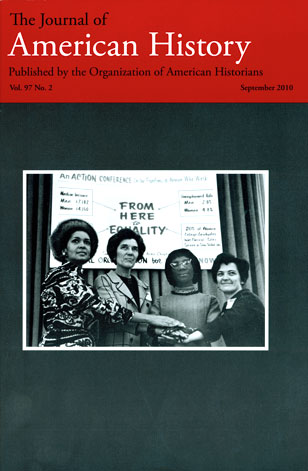Last modified: Monday, October 11, 2010
Journal of American History: re-examining antislavery's founding moments
FOR IMMEDIATE RELEASE
Oct. 11, 2010
BLOOMINGTON, Ind. -- In 1773, Dinah Nevil crossed from New Jersey to Philadelphia with her four children and petitioned a court for emancipation, striking an early blow for freedom that has been all but forgotten in most accounts of the American and British antislavery movements.
In the latest issue of the Journal of American History, Kirsten Sword, an assistant professor of history at Indiana University Bloomington, re-examines Nevil's story along with the strategic deceptions that were practiced by abolitionists in the late 18th century.
The Journal of American History is published at Indiana University Bloomington by the Organization of American Historians.

U.S. Rep. Shirley Chisholm stands with National Organization for Women leaders in the photo on the cover of the September 2010 Journal of American History. The issue includes an article about NOW's 1970s jobs campaign against Sears, Roebuck & Co.
In "Remembering Dinah Nevil," Sword describes how Quaker abolitionists tied the movement to the American Revolution and embraced nonsectarian leaders such as Benjamin Franklin and William Wilberforce. "They aligned antislavery with the national projects of the 1780s by rebranding it," she writes.
The tactic steered the founding narrative away from Dinah Nevil, who may have been of mixed African and American Indian ancestry and who sued for freedom under a Pennsylvania law prohibiting the enslavement of Indians. Her case dragged on for years, and Nevil languished in the Philadelphia workhouse, where two of her children died. Finally, after the revolution, the Quaker abolitionist leader Thomas Harrison purchased freedom for Nevil and her remaining children.
"Dinah Nevil endured," Sword writes. "She stood with those who had made her a cause even when the protection they offered seemed more like punishment . . . Asserting freedom and enduring the consequences are actions worth remembering."
In other articles in the September 2010 JAH issue:
- Matthew Furrow examines how political pressures and pseudoscientific attitudes about race undermined Northern planning for post-Civil War Reconstruction in his article "Samuel Gridley Howe and the Black Population of Canada West."
- Andrew Wender Cohen argues that government efforts against smuggling in the late 19th century helped define America as a masculine, white, Christian republic in "Smuggling, Globalization and America's Outward State."
- Katherine Turk examines the structure, tactics and objectives of the National Organization for Women, focusing on an employment rights campaign by its Chicago chapter in "The NOW Sears Campaign and Liberal Feminism."
The September issue also features an interchange discussion and a supplement of book reviews on Latino history. In the latest JAH Podcast, Associate Editor John Nieto-Phillips speaks with Virginia Sanchez Korrol, professor emerita at Brooklyn College of the City University of New York and a participant in the interchange.
For more information and links to full-text articles and the podcast, see https://www.journalofamericanhistory.org/.